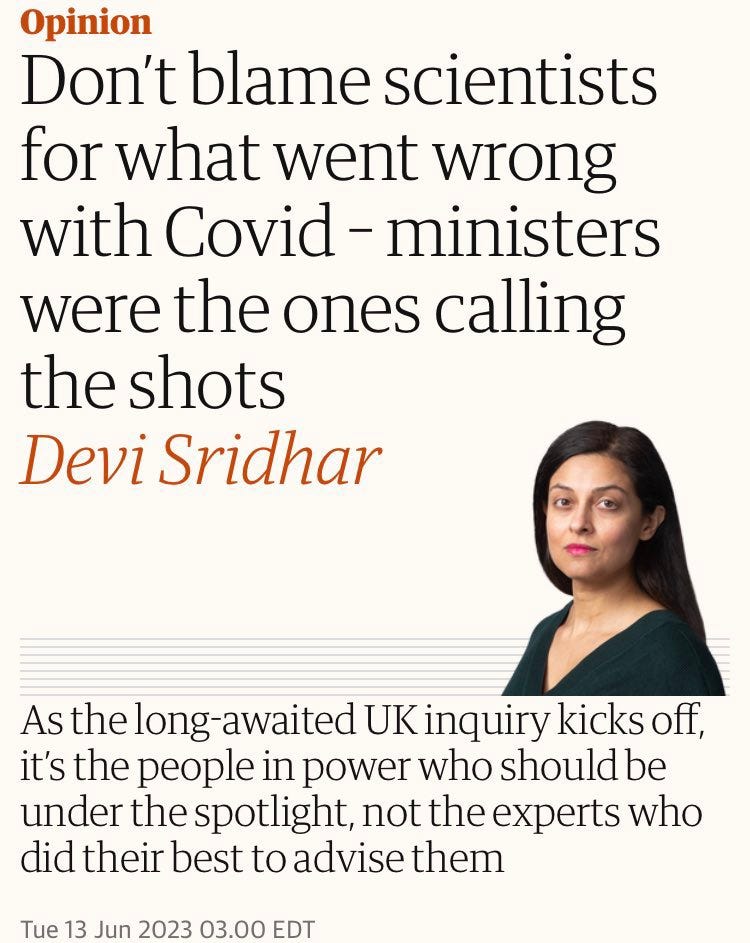The Covid inquiry in the UK has just begun and we are all hoping that it won’t be a whitewash. If I were a betting man or woman (we can choose now) however….
It already doesn’t look great with attendees being made to test for Covid before attending. All staff and visitors have been asked to take a lateral flow test before entering the building. Furthermore, if someone tests positive, they have been told to stay away from the hearing. Free masks are being provided and ‘a disinfectant fogging treatment’ is being used every evening to reduce transmission risks.
So it looks like a completely unbiased inquiry, even before it begins.
But some people are beginning to squirm. Lockdown and Zero Covid enthusiast, Devi Sridhar, has written a piece in The Guardian today called “Don’t blame scientists for what went wrong with Covid - ministers were the ones calling the shots”. She says “it’s the people in power who should be under the spotlight, not the experts who did their best to advise them”.
Devi is a Professor at the University of Edinburgh where “she holds a Personal Chair in Global Public Health”. She is also on the World Economic Forum Council on the Health Industry and part of the Expert review group of the Wellcome Trust. Sridhar was a World Economic Forum Young Global Leader graduate of 2021 and Bill Gates endorsed her book ‘Preventable - How a Pandemic Changed the World & How to Stop the Next One’ saying “I’m excited to see Devi Sridhar’s book in paperback. Her way of thinking about preparing for the next pandemic is one we should all pay attention to”.
During the pandemic, Devi was a regular on TV, scaring the public into panicking about Covid. She consistently wanted more testing and tracing, supported early and long lockdowns, called for school closures and travel restrictions and wanted as many people vaccinated as possible.
So is it any wonder that she is worried that the “government has already started to close in on scientists and point the finger at them for the poor response in the early stages of the pandemic”.
Policy measures such as closing gyms or schools or play parks, or the introduction of mandatory face coverings, were conveyed as “scientific” decisions, but they weren’t. Scientists could present the probable risks and benefits of certain policy options, but the final decision didn’t lie with them.
That’s right, Devi, it was nothing to do with you.
In terms of the response itself, public health scientists, including myself, had our own ideas for what the best approach would be (including learning from other countries that had had earlier waves of Covid-19) and these were presented to ministers in the form of briefings and papers – just as with any other area of policy, from defence to the economy. The pandemic brought a new immediacy to scientific advice, but it didn’t fundamentally change the job of elected politicians, which was to balance these multiple streams of advice, and decide what the next stage of the response would be.
‘I know I said schools should shut down and as a result a lot of kids got messed up but….look… over there… squirrel. Those silly squirrels, anyway, where was I, I’ve completely forgotten what I was talking about…oh well’. [Fictitious Devi!]
What’s particularly surprising is when government ministers such as Sunak, when he was chancellor, chose not to take any scientific advice at all in policy decisions, such as in the launch of “Eat Out to Help Out”. In this scheme, the public were encouraged and actively subsidised to spend money in one of the riskiest settings for transmission: indoor hospitality. They were led to believe it was safe, even though scientists could clearly predict this would lead to onwards transmission and would probably undo the progress made in bringing case incidence down going into autumn.
What is unsurprising is that the “Eat Out to Help Out” scheme actually made no difference to transmission rates. Fortunately, Sunak didn’t take scientific advice but instead took economic advice which showed the economy was on its knees. There is plenty of evidence showing that during this scheme, rates in most European countries, including the UK, dropped because it was summer. And then when it got to autumn, rates increased again, because that’s what the seasonal virus pattern looks like.
Devi concludes:
Scientific advice can provide data on the risks and benefits of closing schools or gyms or of “doing nothing”, but no scientist ever had the executive power to make policy decisions. This was the responsibility of elected officials. And knowing my academic colleagues, none of us would have wanted that power either.
My prediction is that the inquiry will find that the Covid response was poor but not because they locked down, shut hospitals, abandoned care homes etc etc but because decision making was terrible and scientists and ministers didn’t communicate effectively. Just in time for the WHO treaty, providing the country with unified leadership and expert advice. The media will whip everyone up into a frenzy about how many lives could have been saved and the people will call for the WHO to rescue us.





I agree with your prognosis. No “inquiry” is actually anything other than a whitewash.
"I'm an expert in public health" says Devi in the guardian. I guess this is what Sartre means when he says "hell is other people".. their continual self aggrandizement, posturing, pretences and misidentification.